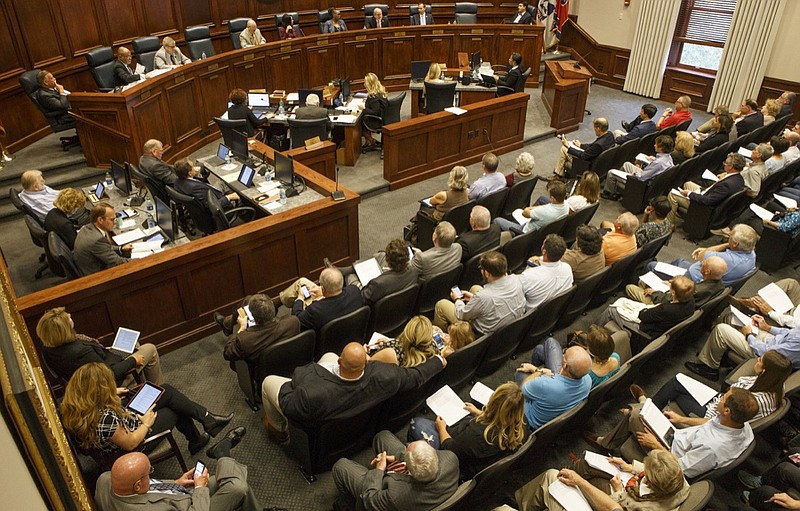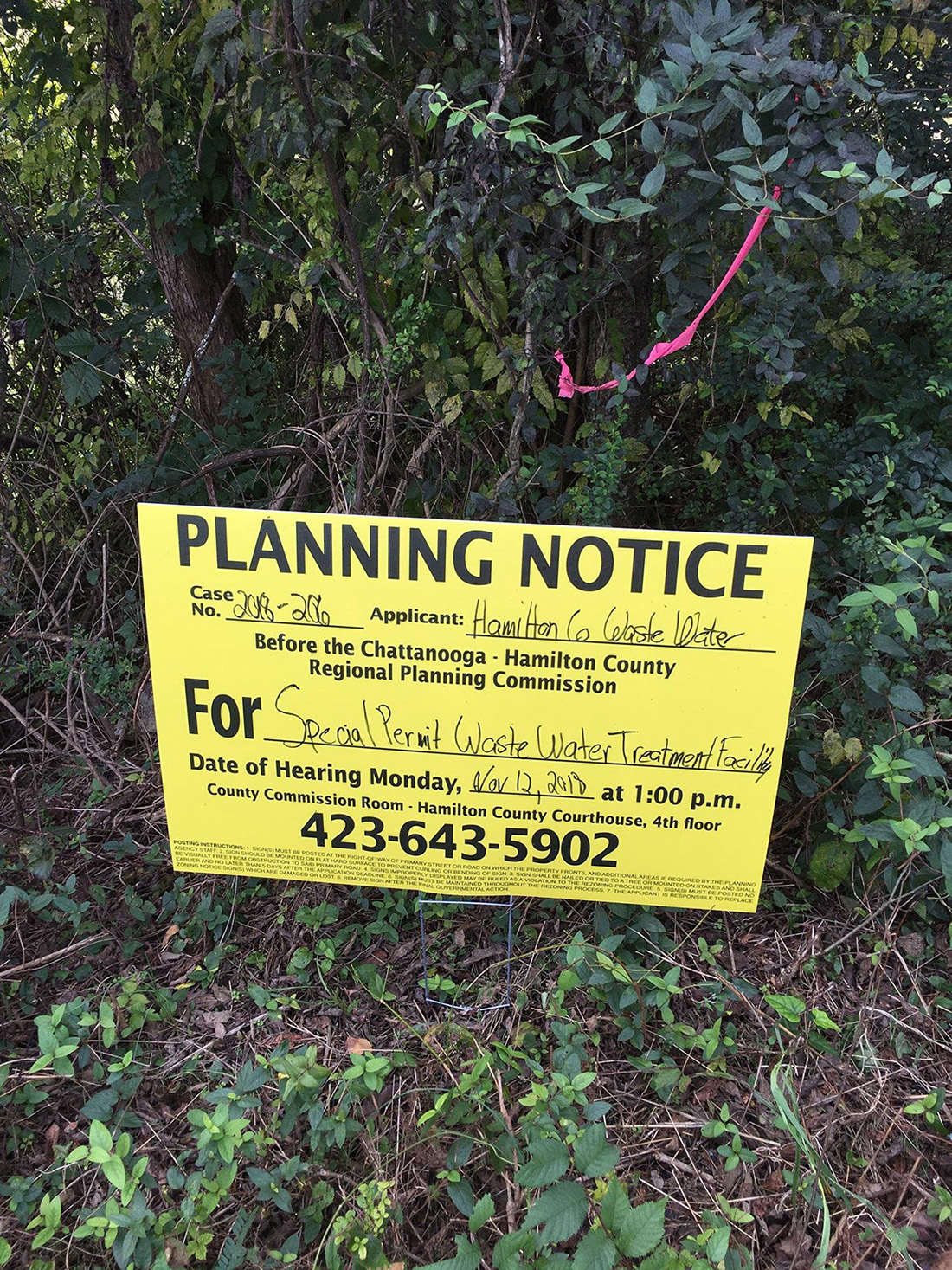Plans for a new sewage treatment plant in the Ooltewah area got a setback Wednesday.
Confronted by a crowd of angry homeowners, Hamilton County commissioners flushed a proposal to spend $2.6 million for a site on Mahan Gap Road in a 6-0 vote.
But that doesn't mean the plans are down the drain.
Attacked by commissioners and homeowners alike for keeping the public in the dark, the Hamilton County Water and Wastewater Treatment Authority is going to "hit the restart button" and try to win public support for what most people agree is a badly needed bit of infrastructure.
"We have to get this right and that was made abundantly clear this morning," WWTA spokeswoman Robin Derryberry, of Derryberry Public Relations, said Wednesday afternoon.
"We've got a lot of information to share and we need to be sharing it early and often."
Commissioners led the attack when the resolution for the county to buy and hold the property came up for a vote. It was the last item on the agenda, but Chairman Sabrena Smedley moved it up in consideration of the people packing into chairs in the commission room.
WWTA Executive Director Mark Harrison and county Finance Administrator Al Kiser briefed commissioners at their agenda session last week on the project's location, west of Ooltewah-Georgetown Road and bordered by Lost Savannah Creek, and costing $45 million. Funding for the project was included in the 2018 bond issue, which was paid for by a property tax increase commissioners approved last year.
But Wednesday, commissioners harshly criticized the WWTA for not letting the public in on the plans.
The proposed plant is in Commissioner Chester Bankston's district, and he made a motion to deny the purchase.
"I'm upset," Bankston said. "You cannot do our neighbors that way. I represent these people and you embarrassed me."
Commissioner Tim Boyd said concerns people expressed to him in emails about health, safety and odor problems "are not founded" when the proper technology is used, but said, "the way this was brought before us is part of a habit of keeping the community in the dark."
He added, "Do not bring any more time-sensitive, two-week notices to this commission. That is just bad government."
Commissioner David Sharpe conceded the need for new sewer capacity to allow growth in the north end of the county, but said, "I don't appreciate being put in this position with such little notice."
Commissioners Katherlyn Geter and Randy Fairbanks also said they were uncomfortable, while Commissioner Greg Martin asked to amend Bankston's motion to make the purchase contingent on satisfying community concerns. Commissioners Chip Baker and Warren Mackey were absent.
Harrison and WWTA board chairman Mike Moon both apologized and took responsibility for not being more open on the front end. Ten sites were considered, and this one was best because it slopes toward the Tennessee River and most of the plant will be gravity-fed rather than pumped, at greater cost.
The plant will use the latest technology - similar to a plant in Pigeon Forge, which is right next to a high school, and one in Murfreesboro that is in a public area that includes a library, sports fields and a Marriott hotel. There should be little to no odor, and the treated water will be pumped into the channel of the Tennessee River rather than the bays lined with upscale homes.
They said they kept the negotiations quiet to minimize the effect on the price, which Moon said was $200,000 under the appraisal. And building the plant would enable growth not just in the Ooltewah-Collegedale area but neighboring Bradley and Meigs counties, Hamilton County Mayor Jim Coppinger added.
Also, the federal government has been cracking down on water contamination statewide. Some local officials expect the county will at some point be faced with a consent decree similar to Chattanooga's $250 million remediation plan.
None of that weighed for a second with the dozen or so neighbors who trooped to the microphone and, supported by sustained applause from the audience, asked commissioners to turn down the purchase.
Brent Smith, who lives on North Heron Bay, said constituents' "level of trust is in jeopardy." He said the only notice neighbors had received was a yellow rezoning placard stuck on a dead-end street that wasn't even adjacent to the proposed site.
There needs to be a community needs assessment, Smith said, "instead of acting like children at Christmas where we have to have it now, and pay for it later."
Scott McDonald wondered whether WWTA board members had "ulterior motives" and were looking to benefit their own businesses. Moon, a developer, said he has no property options in the area and "would never use this to my advantage."
Forrest King, who lives on North Heron Bay, and a nurse who lives on Snow Hill Road worried about health concerns from pathogens, heavy metals and other contaminants.
The nurse, Jeff Teter, said he has five children and is "deathly concerned about pathologic issues this wastewater plant brings to my backyard."
Another waterfront resident wanted an investigation into how the site was chosen.
"This feels like when the train leaves the station, we know where the next destination is, which is a sewage treatment plant in our backyard," he said.
The vote was unanimous of those members present, with Boyd leaving the meeting soon after speaking against the resolution.
Derryberry said Wednesday evening the WWTA believes it can make its case to the public, explain the need for the project and the technology that will make the plant an unobjectionable neighbor.
It will hold a series of public meetings, the first on Oct. 11, before going before the planning commission in November. She said WWTA officials hope to bring the financing proposal back to the county commission on Dec. 19.
"We're going to work with the community to come up with a plan for the betterment of the community, she said.
Contact staff writer Judy Walton at jwalton@timesfreepress.com or 423-757-6416.


